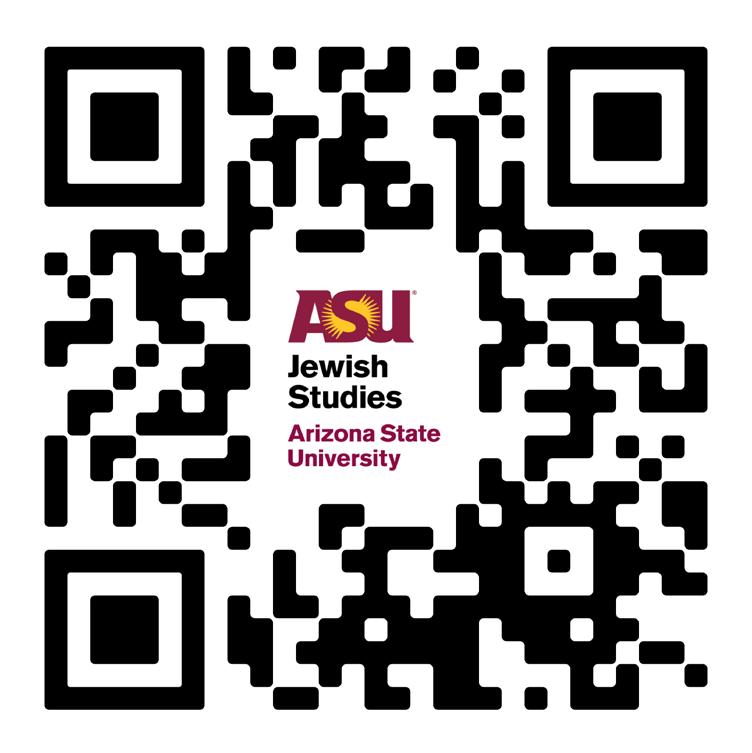ASU Jewish Studies Annual
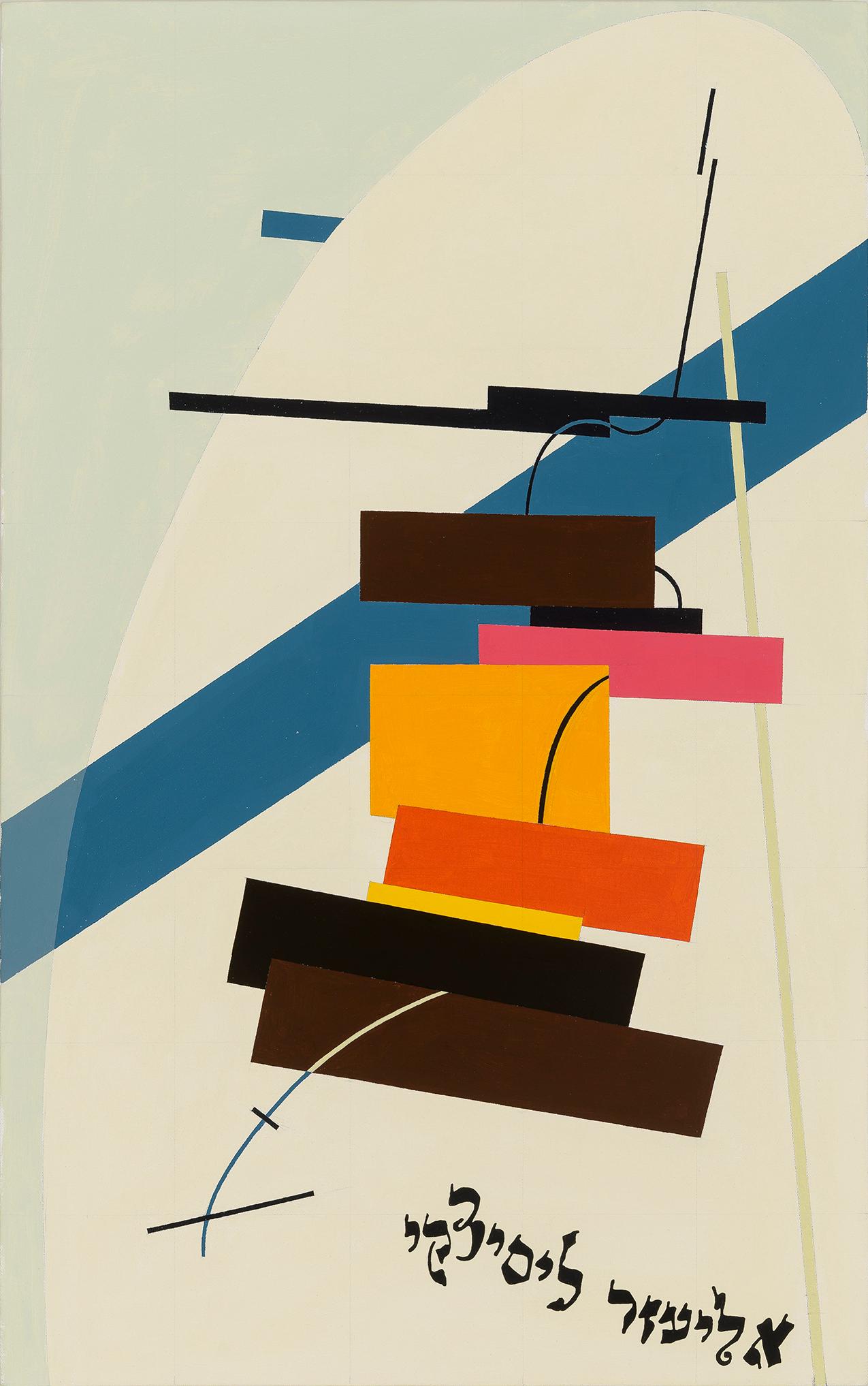


Project Lissitzky focuses on the 1916-1922 works of the key figure of 20th century Russian modernism El Lissitzky (1890-1941). The project is a reflection on the issues of internationalism vs. identity within the Russian Avantgarde. It interrogates the notion of hyphenated identity, in particular “Russian-Jewish,” and presents the “Russian Avant-garde” as situated at a point of tension between universality and ethnic particularity.
Yevgeniy Fiks was born in Moscow in 1972 and has been living and working in New York since 1994. Fiks has produced many projects on the subject of the Post-Soviet dialog in the West, among them: “Lenin for Your Library?” in which he mailed V.I. Lenin’s text “Imperialism: The Highest Stage of Capitalism” to one hundred global corporations as a donation for their corporate libraries; “Communist Party USA,” a series of portraits of current members of Communist Party USA, painted from life in the Party’s national headquarters in New York City; and “Communist Guide to New York City,” a series of photographs of buildings and public places in New York City that are connected to the history of the American Communist movement.
Fiks will be presenting his work at the ASU Art Museum in 2026. See the events calendar for more details.
Jewish Studies is more to me than a professional passion. It is the foundation of my own Jewish identity. I connect to my own Jewishness through participating in a continuum of Jewish creativity, resiliency and cultural adaptation. While as a scholar, I am a social historian of the Jewish people; as a Jewish person, I’m a student of the entirety of the Jewish experience. My first goal as the director of the Center for Jewish Studies at ASU is to share my passion for Jews and Judaism with you: our students, our faculty and our community.
I’m taking over as director of ASU Jewish Studies at a very difficult time in the history of the Jewish people. I believe that at ASU, we are especially well situated to rise to any challenge. We benefit from strong institutional support, we have unshakable community partnerships on campus and around the Phoenix metro area, and we are the beneficiaries of over sixteen years of foundational and visionary leadership from our previous director, Hava Tirosh-Samuelson. Together, as a community of scholars and learners, I know we can overcome any challenge. I endeavor to earn your trust to help lead us through these difficult times.
The mandate of ASU Jewish Studies is to disseminate knowledge of the Jewish experience as widely as possible. Education is our first and best defense against antisemitism. It is also through education that we stand together as a community. Jewish Studies is therefore dedicated to exploring all facets of the Jewish experience past and present. We are guided by the legacy of Salo W. Baron, a foundational scholar of Jewish Studies in the United States, who argued that Jewish history must be understood beyond a framework of suffering and persecution if we are to appreciate the full experience of being Jewish. It is indeed during some of the darkest times that the lights of Jewish culture and society shine their brightest.
Together, as a community of learners, we can celebrate, safeguard, and preserve the heritage of the Jewish people and the Jewish religion. We need your help to achieve this goal. Please consider donating to Jewish Studies. Now, more than ever, your support enables us to serve our community.
With warmest regards,
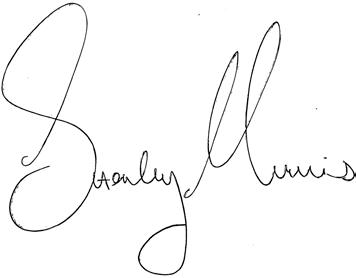
Stanley Mirvis Director, ASU Center for Jewish Studies

On May 14, I stepped down as Director of ASU Jewish Studies after nearly 17 years in this position. On that day we celebrated the accomplishments of Jewish Studies and my own scholarly accomplishments. I thank all those who attended the celebration for their appreciation and affection and all those who have supported Jewish Studies by attending our programs and generously giving to Jewish Studies.
Under my leadership, Jewish Studies has become a well known program, nationally and internationally, and an impactful program locally. Our main accomplishments include:
• Establishing the Center for Jewish Studies
• Instituting a B.A. Major in Jewish Studies
• Co-founding and managing Judaism, Science, and Medicine Group (JSMG)
• Moving Genocide Awareness Week to ASU
• Managing robust public-facing programs (lectures, exhibits, and performances)
• Convening research conferences and workshops
• Supporting ASU students with scholarships
• Awarding the Baron Dissertation Award to graduates of other institutions
• Enriching the cultural life of metropolitan Phoenix
The various activities of Jewish Studies have communicated one primary message: Jewish history, religion and culture are of value to all people and not only to Jews. Since the Jewish tradition has enriched Western culture in numerous ways, one cannot claim to be an educated person without knowing about Jews and Judaism. Such knowledge is especially vital today given the resurgence of antisemitism and growing anti-Israel sentiment. I encourage students, adult learners and the community at large to become involved with ASU Jewish Studies and learn as much as possible about Judaism and the Jews.
I am deeply grateful for the staff of Jewish Studies, past and present, for carrying out the mission of Jewish Studies. I also thank the wonderful faculty of Jewish Studies for educating ASU students to understand the greatness of Judaism and our donors for their generous support. I am confident that Professor Stanley Mirvis, the incoming Director of Jewish Studies, will build on what I have created and will take it to the next level of excellence. I wish him success and look forward to celebrating his accomplishments.

“Hava’s
decades of scholarship and public engagement serve as a lasting reminder that religion, science, philosophy and Jewish Studies can work together to help all of us to build better futures, for ourselves and for the world. She has not only been an inspiring leader for the university but also for local, national and global communities. I am grateful to have known and worked with her over the past years.”
Jeffrey Cohen, Dean of Humanities at The College of Libaral Arts and Sciences
The Lowe Family Holocaust and Genocide Lecture: “Nationalism and Antisemitism: The Case of Poland” | Konstanty Gebert (Polish journalist and political activist), Joanna Michlic (Lund University, Sweden); Anna Cichopek-Gajraj (ASU).
The Lowe Family Holocaust and Genocide Lecture: “Jewish Music in Poland, Past and Present” | Neal Brostoff (concert pianist and musicologist).
“The State of the State of Israel” | Nadav S. Berman (University of Haifa and ASU).
• “On War and Peace in Israel and in Jewish Tradition: A Conversation With Alexander Yakobson.”
• “Jews, Arabs, Judaism and Islam Under a Christian Canopy: A Conversation With Uriya Shavit.”
• “Political Theology Within the Jewish-Israeli Case: A Conversation With Annabel Herzog.”
ASU Humanities Week Jewish Studies Lecture: “Gene Wilder and Jewishness: From ‘The Producers’ to ‘The Frisco Kid.’” | Kevin Sandler (ASU).
“A Thousand Years of Jewish History” | Gary A. Rendsburg (Rutgers University).
• “The First Diasporas: Egypt and Babylonia.”
• “What Happened to the Jews After 70 C.E.?”
• “The Jews of Arabia.”
“How to be a Jew Today: A New Guide to God, Israel and the Jewish People.” | Noah Feldman (Harvard University).
“Modern Jewish Philosophy” | Hava Tirosh-Samuelson (ASU).
• “Martin Buber: Judaism as Ethics.”
• “Joseph Soloveitchik: Judaism as Law.”
• “Mordecai Kaplan: Judaism as Civilization.”
“Arguments With a Ghost: A Reading and Discussion Series in American Jewish Literature.” | Brian Goodman (ASU).
• “Who Owns Anne Frank?”
• “The Ghost Writer”
• “What We Talk About When We Talk About Anne Frank”
Albert and Liese Eckstein Scholar-in-Residence Program | David N. Myers (UCLA).
• “Jews and Jewishness on College Campuses Today: A Look at the Past, a Glance to the Future.”
• “Shifting Attitudes Toward Israel Among American Jews.”
“The Italian Renaissance, the Jews, and the Arts” | Daniel Stein Kokin (ASU).
• “Renaissance Christian Art Meets the Hebrew Language.”
• “Michelangelo’s Moses and the Jews: A Renaissance Legend and its Reception.”
• “Leone de’ Sommi: A Hebrew Playwright of the Italian Renaissance.”
Murray and Sabina z”l Zemel Educators Conference
Cosponsored by Arizona State University, AZ Humanities, Phoenix Holocaust Association, Northern Arizona University, Phoenix Public Library, Arizona Jewish Historical Society and Bureau of Jewish Education
Judaism, Science and Medicine Group (JSMG): “The Many Faces of Love: Judaism, Science and Medicine.”
Supported by the Harold and Jean Grossman Chair of Jewish Studies and the Irving and Miriam Lowe Chair of Modern Judaism
The Rosenbluth Family Charitable Foundation Genocide Awareness Week
Planned in collaboration with Arizona State University, Northern Arizona University and University of Arizona
30
In June 2025, Dr. Naomi Jackson z’’l passed after battling a long illness. Naomi was a professor in the school of Music, Dance, and Theater. Her scholarship on dance and performance focused on Jewish cultural expression and social justice.
In 2018 she organized the highly successful and pathbreaking “Jews and Jewishness in the Dance World” conference here at ASU which brought together scholars from all over the world. She was also the lead editor of the Oxford Handbook of Jewishness and Dance.
“Naomi was an amazing scholar because she was fearlessly curious,” said Liz Lerman, Institute Professor in the Herberger Institute for Design and the Arts and Jewish Studies Faculty Affiliate. “She loved our students. She thrived in the world of dance, where she could bring her embodied knowledge together with her brilliant mind. I already miss her. We all do.”
• Giovanni Barberio
• Victoria Bilgoray
• Ashton Branca
• Einat Orlev Dolev
• Justin Hoffman
• Guadalupe Kilby
• Katherine Kloberdanz
• Awsten “Sophia” Matthies
• Destiny Pitts
• Morgan Pollov
• Alyse Schmidt
• Kat Trueblood

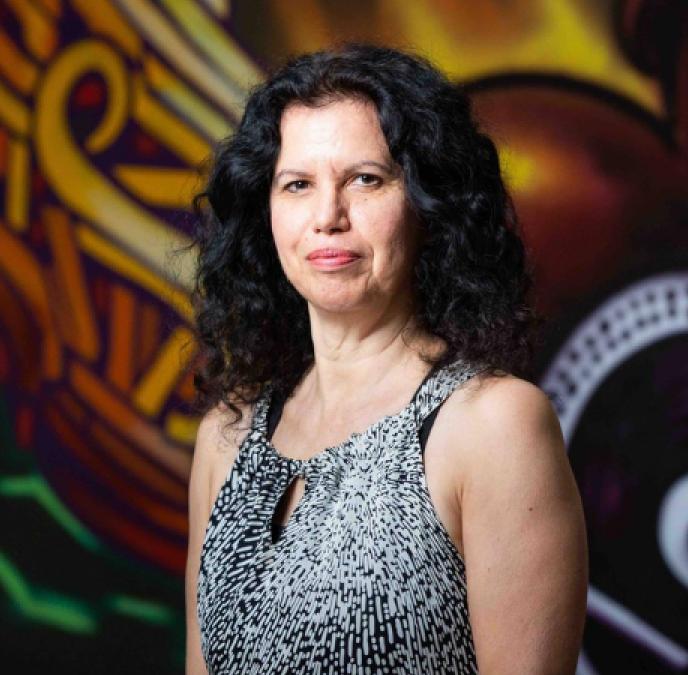
• Cabot Family Scholarship
• Chulew Family Endowed Scholarship in Jewish Studies
• Great Students Graduate Fellowship
• Benjamin Goldberg Memorial Scholarship
• Seymour H. Jacobs Memorial Scholarship
• Morris and Julia Kertzer Scholar
• Schwartz Honors and/or University Scholarship
• Schwartz Research, Study and Travel Grant
• Schwartz Jewish Studies Scholarship/Fellowship
ASU study abroad trip to Amsterdam and Berlin, partially funded by ASU Jewish Studies scholarships.
Volker Benkert, Associate Professor
"Apologia and Redemption. World War II and the Holocaust in Recent German Film." ASU Humanities Institute Fellowship, 2024-25.
J. Eugene Clay, Associate Professor
“The Beast Computer of Brussels: An American Invention That Conquered the World.” Journal of the American Academy of Religion, 92 (2024): 251-275.
“Power, Freedom, and Modernity: Spiritual Christian Molokans in Russia and the United States in the Early Twentieth Century.” Religion and Secular Modernity in Russian Christianity, Judaism, and Atheism, edited by Ana Siljak (Cornell University Press, 2024): 180-195.
Brian Goodman, Associate Professor
"After Cold War Studies," American Literary History, 37 no. 1, Spring 2025, 172–184.
"The Antipolitical Imagination: Literature, Dissent, and Human Rights," Summer Institute for the Study of East Central and Southeastern Europe, American Council of Learned Societies, June 2025.
Pamela Jensen Award for Best Book in Politics, Literature, and the Arts from the American Political Science Association for “The Nonconformists: American and Czech Writers across the Iron Curtain” (Harvard University Press, 2023).
Joe Lockard, Associate Professor STEM Education in US Prisons, Brill, 2024.
“Prison Writing Anthologies in the United States,” Genre 57 (2024) 259-282.
“US Death Row Literature and Public Mobilization against Capital Punishment,” Arizona Quarterly, 80 (2024): 57-81.
Laurie Manchester, Associate Professor
“The Legacy of the Cold War: Post-Colonial Identity and the Ambiguous Reunion Between Russophone Residents of Harbin who Repatriated to the Soviet Union and those who Remained Emigres,” Kritika: Explorations in Russian and Eurasian History, 24 no. 2 (2024): 327358.
Stanley Mirvis, Associate Professor
“Disaster, Race, and Rabbinic Authority: An Alternative Path of Jewish Integration in Early Twentieth Century Jamaica,” AJS Review, 48 no. 2 (2024): 308–332.
“Three Sketches of Character: The Legacy of Isaac Mendes Belisario” Shofar: An Interdisciplinary Journal of Jewish Studies, 43 no. 1 (2025): 134–157.
“Erev Rav (A Mixed Multitude): Class, Gender, and Ideological Cleavages” and “Hasidut and Haskalah (Enlightenment): Toward the Watershed of Modernity” in Early-Modern Jewish Civilization: Unity and Diversity in a Diasporic Society. An Introduction, ed. David L. Graizbord (Routledge: 2024), 379–430.
Francoise Mirguet, Associate Professor
“Love and Hate in Deuteronomy.” In Oxford Handbook of Deuteronomy, edited by D.C. Benjamin (Oxford: Oxford University Press, 2025), 131-145.
“Kissing in the Hebrew Bible: The Body Makes the Bond.” Biblical Interpretation (2025), advance online publication.
Registration is required for all events, both in person and on Zoom. Please follow the links in blue to learn more about an event or to register. Additionally, you can use this QR code to access our online calendar.
Please note: All programs are listed according to Arizona time. Arizona does not observe daylight saving time. If you do not live in Arizona, please Google the time difference between where you live and Phoenix, Arizona for the date of the program you are registering for to ensure you join us at the correct time.
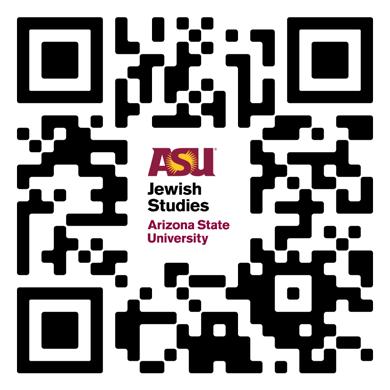
Sunday, Sept. 7 | 10 - 11:30 AM | Zoom | “Lowe Family Holocaust and Genocide Education Lecture, Polish Reaction to the Holocaust: The Never-Ending Controversy and Why Populists Like It.” | Dariusz Stola (Institute of Political Studies of the Polish Academy of Sciences). Register at: jewishstudies.asu.edu/poland
Since the 1980s, Poland has been the scene of major public debates about national reactions to the Holocaust. These debates contributed to the evolution of the collective memory of World War II, but in recent years, they have become a battleground of polarization. In this lecture, Professor Stola of the Institute of Political Studies of the Polish Academy of Sciences in Warsaw and formerly the director of the POLIN Museum of the History of Polish Jews, Warsaw, will review the controversies and highlight a few factors that made them so intense, including the gap between academic and popular understandings of the past and the role of social media. Cosponsored with the VOSJCC.
Tuesday, Sept. 9 | 10 – 11:30 AM | In person | ASU Tempe, Coor Hall Room 4403 (976 S. Forest Mall, Tempe; Parking at 10th and Myrtle) | “Innovations in Holocaust Education: Breaking Ground on the Hilton Family Holocaust Education Center.” | Talli Dippold, Executive Director & Rabbi Jeffrey Schesnol, Project Manager Register at: jewishstudies.asu.edu/hilton
In June 2025, 10 holocaust survivors together with Arizona Governor Katie Hobbs and Phoenix Mayor Kate Gallego broke ground on the Hilton Family Holocaust Education Center. Leaders of the Hilton Holocaust Education Center will discuss their vision for the center and the mission of building a new museum from the ground up. Cosponsored with The Jewish Faculty and Staff Association.
Wednesday, Sept. 10 | 7 – 8:30 PM | In person | Scottsdale Community College, Indigenous Cultural Center (9000 E Chaparral Rd, Scottsdale) | “Phoenix Holocaust Association Speaker Series, Introduction to Jewish History.” | Stanley Mirvis (ASU). Register at: jewishstudies.asu.edu/teachhistory
“Introduction to Jewish History” is a crash course in the Jewish historical experience from Late Antiquity to the Holocaust. It presents the major periods, geographies, trends and concepts that have shaped Jewish history. Cosponsored with The Phoenix Holocaust Association.
Wednesday, Sept. 17 | 5 - 6:30 PM | In person | ASU Hillel (1012 S Mill Ave., Tempe) | “The High Holidays in America: A Preview of JST 211 — Jews and Judaism in America.” | Stanley Mirvis (ASU).
Register at: taylor@hillelasu.org
In preparation for spring semester registration, Professor Stanley Mirvis will preview his class, JST 211 “Jews and Judaism in America” for ASU students. This visual and interactive presentation focuses on the observance of the High Holidays in America, including denominational differences, culinary practices and material culture. Students only. Dinner will be provided free with registration. Cosponsored with ASU Hillel.
Sunday, Oct. 12 | 4 - 5:30 PM | In person | Beth El Congregation (1118 W Glendale Ave, Phoenix) | “Chamber in the Chapel: A Hoshana Rabbah Lecture-Performance.”
Register at: jewishstudies.asu.edu/HRConcert
Hoshana Rabbah, the final day of the Sukkot festival, is one of the most fascinating and least appreciated dates on the Jewish calendar. Come join us for a lecture by Dr. Daniel Stein Kokin exploring the significance and unique practices of Hoshana Rabbah and a performance of “elyon, melits u-mastin” (“God, Defender and Accuser”), a vocal and instrumental piece composed especially for this day in 1733 in Casale Monferrato, Italy. Cosponsored with Beth El Congregation, Center for Jewish Philanthropy of Greater Phoenix and Valley Beit Midrash.
Tuesday, Oct. 21 | 6 – 7:30 PM | In person and Zoom | Or Tzion Congregation (16415 N 90th St, Scottsdale) | “Conscious AI - The New Golems?” | Mois Navon (Ben Gurion University). Register at: jewishstudies.asu.edu/AI
While hard to imagine, scientists are working on building robots (and chatbots) with human-level consciousness. Is this something to look forward to? Join Dr. Mois Navon for a surprisingly relevant talk that will make you think about life, love and humanity. Cosponsored with Or Tzion Congregation and Valley Beit Midrash.
Wednesday, Oct. 22 | 12 - 1:30 PM | In person and Zoom | ASU Tempe, Coor Hall Room 4403 (976 S. Forest Mall, Tempe; Parking at 10th and Myrtle) | ASU Humanities Week Program: “Jewish Travelers and Voyages of Diasporic Self-Discovery.” | Stanley Mirvis (ASU). Register at: jewishstudies.asu.edu/HWMirvis
Dr. Mirvis will share the long history of pre-modern Hebrew travel literature from the ninth century through the eighteenth century. Focusing specifically on an eighteenth-century Hebrew travel journal, he will explore how Jewish groups around the world understood each other and their differences. This presentation demonstrates that travel was more than just a neutral way for Jews to engage with the non-Jewish world, but it also facilitated “diasporic selfdiscovery.” Vegetarian lunch will be provided.
Thursday, Oct. 23 | 4 – 6 PM | In person and Zoom | ASU Tempe, Memorial Union 2nd Floor, Pima Auditorium (301 E Orange St., Tempe) | “Torah and Tactics: Jewish Ethics, Just War and the State of Israel.” | Alan Mittleman (JTS) Register at: specialevents.asu.edu/torah-tactics
Jewish ethical thought has teachings that parallel the Western “Just War” tradition, defining conditions under which war is morally permissible. This talk will explore how Jewish teachings relate to views of “just war” in Western democracies, particularly the State of Israel in the wake of the Oct. 7, 2023 attack. This talk evaluates the resources in Jewish ethics that can contribute to more humane conduct in war, as well as those elements of the tradition that complicate such efforts. Cosponsored with ASU’s Center for the Study of Religion and Conflict.
Tuesday, Nov. 4 | 9 AM - 4 PM | In person | Franciscan Renewal Center Conference Center (5802 E Lincoln Dr, Scottsdale) | “Murray and Sabina Zemel z’’l Educators Conference on the Holocaust and Genocide.” Register at: jewishstudies.asu.edu/Zemel2025
This conference supports Arizona teachers in building programs, developing curricula and sharing best practices in educating on the Holocaust and other genocides. Substitute stipends offered on first come, first served basis from Public History, see registration page for more information. Cosponsored with Arizona Jewish Historical Society, Barbara and Barry Zemel, Bureau for Jewish Education, Hilton Family Holocaust Education Center, the Phoenix Holocaust Association and Northern Arizona University.
Lecture Series “In Search of Ancient Israel” | Gary Rendsburg. (Rutgers University) Register for all programs in this series at: jewishstudies.asu.edu/AncientIsrael
Two centuries of archaeological exploration in the Near East has revolutionized our understanding of the world that produced ancient Israel and its abiding text, the Bible. These three lectures – all amply illustrated via PowerPoint – proceed in chronological order, as Dr. Gary Rendsburg reveals the history of Israel from its earliest origins through the destruction of Jerusalem in 586 B.C.E. Cosponsored with VOSJCC.
Wednesday, Nov. 5 | 7 - 8:30 PM | Zoom | “In Search of Israelite Origins.”
Learn about the literary and archaeological evidence from both Egypt and Israel relate to ancient Israelites. Biblical accounts concerning the slavery, the exodus, the wandering and the settlement in Canaan are treated against the backdrop of ancient Near Eastern evidence, with an attempt to dovetail Israel’s own narrative with the data emerging from two centuries of archaeological exploration in the Near East.
Wednesday, Nov. 12 | 7 - 8:30 PM | Zoom | “In Search of David and Solomon”
The two great kings of ancient Israel are well known to readers of the Bible, but are they to be found in the archaeological record? Neither name appears in any contemporary document, so how can one determine whether or not the descriptions of their reigns in the Bible have any historical value? This lecture will survey the archaeological evidence from Jerusalem and elsewhere to answer these questions.
Wednesday, Nov. 19 | 7 - 8:30 PM | Zoom | “In Search of the Kingdoms of Israel and Judah”
The death of Solomon resulted in the establishment of two kingdoms, Israel in the north and Judah in the south. Both entities are mentioned in contemporary documents from Aram, Moab, Assyria and Babylonia. In two texts the kingdom of Judah is called not “Judah,” but rather “the House of David”! Our tour of these artifacts will bring us to the world’s great museum collections: the Louvre, the British Museum, and the Israel Museum.
Lecture Series: “Sing Every Day: Jewish Music and Spirituality” | Michael Cherlin (University of Minnesota) Register for all programs in this series at: jewishstudies.asu.edu/Music
This series will address three aspects of the making, interpretation and apprehension of music: modes of perception, historically located social contexts and social responsibility or a musical ethics. All three of these overarching topics will be informed by Jewish sources and Jewish contexts. Cosponsored with VOSJCC.
Monday, Dec. 1 | 1 - 2 PM | In person and Zoom | VOSJCC, Room 103/104 (12701 N. Scottsdale Rd., Scottsdale) | “On Kabbalah and Music: Seeing Through, Hearing Through”
This lecture will explore a way of understanding the emanation of the ten sefirot becomes the basis for my understanding of creating, performing and hearing music.
Monday, Dec. 8 | 1 - 2 PM | In person and Zoom | VOSJCC, Room 103/104 (12701 N. Scottsdale Rd., Scottsdale) | “Gustav Mahler and Arnold Schoenberg: A Contrast of Suppressed Yiddishkeit and Reawakened Judaism”
This lecture will discuss two outstanding Jewish composers of overlapping generations, each a friend and admirer of the other, contrasting the very different ways each dealt with his Judaism in the years prior to and through the Holocaust.
Monday, Dec. 15 | 1 - 2 PM | In person and Zoom | VOSJCC, Room 103/104 (12701 N. Scottsdale Rd., Scottsdale) | “The Ethics of Levinas and the Study of Music”
This lecture will focus on the ethical writings of Emmanuel Levinas and their implications for composing, performing and hearing music.
Lecture Series, “Jews and Sports” | Shawn Klein (ASU) Register for all programs in this series at: jewishstudies.asu.edu/sports
This series will explore Jews and sports, Jewish fandom and how sports affects our American-Jewish identity. Cosponsored with VOSJCC.
Sunday, Jan. 25 | 10 - 11:30 AM | In person and Zoom | VOSJCC, Library (12701 N. Scottsdale Rd., Scottsdale) | “American Jews and Sports Fandom”
While Jews have sought belonging in many ways: education, arts, entertainment, science—sports fandom presents a distinctive understanding of what it means to be Jewish in America. Being a fan isn’t just about watching games; it’s about the stories we tell about our teams, our communities and ourselves. We will explore what these narratives might say about American Jewish identity.
Tuesday, March 24 | 7 - 8:30 PM | Zoom | “What, if anything, is Jewish in Sport?”
There is no Talmudic tractate on sport. The Bible is mostly silent. Sholem Aleichem doesn’t write of games in the shtetl. Yet sports are far from absent in Jewish life. Is sport merely a neutral pastime picked up from other cultures or is there something Jewish in sport? This talk explores how Jewish thought and culture might engage with the meaning of sports and play. Can Jewish civilization offer a distinctive perspective on the role of sports and games in human life?
Sunday - Monday, Feb. 1–2 | 9 AM - 3 PM | Zoom | “Judaism, Science, and Medicine Group 2026 Conference: Judaism, Science and Human Flourishing” Register at: jewishstudies.asu.edu/science
The JSMG 2026 conference explores the ever-evolving relationship between Judaism, science and human flourishing. From antiquity to the present, Jewish thinkers have reflected on the meaning of happiness and flourishing through conversations with Western philosophers. Definitions of happiness and flourishing were at the core of how premodern Jews expressed their relationship to Judaism. In the twentieth century, happiness became a topic of scientific investigation. Cosponsored with Valley Beit Midrash and VOSJCC.
Sunday, Feb. 1 | 4 - 5:30 PM | In person and Zoom | VOSJCC, Social Hall (12701 N. Scottsdale Rd., Scottsdale) | Dr. Michael and Ada Anbar Annual Lecture in Judaism, Science and Medicine.: "How Judaism Promoted Worldly Success in the Modern Period." | Robert Eisen (GWU) Register at: jewishstudies.asu.edu/Anbar2026
Worldly success is an important aspect of human flourishing, and Jews have excelled in that type of success in the modern period. Professor Eisen will argue on the basis of his most recent book that traditional rabbinic Judaism played a critical in preparing Jews for worldly success, even though the rabbis who shaped that form of Judaism never envisioned it serving this role. Cosponsored with Valley Beit Midrash and VOSJCC.
Lecture Series: “Contemporary Jewish Philosophers.” | Hava Tirosh-Samuelson (ASU) Register at: jewishstudies.asu.edu/Philosophy
This three-part series features three influential Jewish thinkers who wrestled with the deepest concerns of contemporary Jewish life after the Holocaust. Each of these thinkers is associated with a different way of being Jewish including Reform, Chabad and Modern Orthodoxy. Additionally, each thinker approached Jewishness from different intellectual lenses including Hegelianism, pastoral psychology and moral philosophy. These brilliant thinkers offer us ways of living a meaningful Jewish life by responding to the deepest challenges of our time.
Thursday, Feb. 5 | 1 - 2:30 PM | In person and Zoom | VOSJCC, Social Hall (12701 N. Scottsdale Rd., Scottsdale) | “Emil Fackenheim: Post-Holocaust Theology”
Thursday, Feb 26 | 1 - 2:30 PM | In person and Zoom | VOSJCC, Social Hall (12701 N. Scottsdale Rd., Scottsdale) | “Zalman Schachter-Shalomi: Jewish Spiritual Renewal”
Thursday, March 5 | 1 - 2:30 PM | In person and Zoom | VOSJCC, Social Hall (12701 N. Scottsdale Rd., Scottsdale) | “Jonathan Sacks: “Jewish Morality in a Fragmented World”
Monday, March 9 | 11 AM - 1 PM | In person | ASU Tempe, University Club (425 E University Dr, Tempe) | “Eckstein Scholar-in-Residence: Columbia and the Jews: An Early 20th Century Encounter that Transformed American Higher Education” | Rebecca Kobrin (Columbia University) Register at: jewishstudies.asu.edu/EcksteinFaculty
Since Oct. 7, the Columbia campus has churned with protests against Israel and concerns over free speech. Students and faculty both saw themselves as enmeshed in an unprecedented battle with the university administration over free speech. But how unprecedented was this? For over a hundred years, Columbia College has been shaken by Jews and their distinct political beliefs. This talk looks at how Columbia has struggled across the long twentieth century to address issues raised by its Jewish students and their politics. Lunch provided upon registration. ASU community only.
Monday, March 9 | 7 - 9 PM | In person and Zoom | VOSJCC, Social Hall (12701 N. Scottsdale Rd., Scottsdale) | “Albert and Liese Eckstein Scholar-in-Residence: Credit to the Nation: East European Jewish Bankers and American Finance” | Rebecca Kobrin (Columbia University) Register at: jewishstudies.asu.edu/Eckstein2026
Millions of immigrants who came to America saw their financial lives shaped by East European Jewish financiers like Joseph Marcus and Saul Singer whose stories are now in the dustbin of history, overshadowed by the history of more well-known German Jewish bankers. This lecture shares their stories and how they shaped not only banking in the Jewish community, but the business of mass migration to and real estate development in America itself. Cosponsored with VOSJCC.
Wednesday, March 18 | 10 AM - 12 PM | In person | ASU Art Museum (51 E. 10th St., Tempe) | Workshop: “Crossing Borders: Jewish Art, Literature, and Migration in the Americas.” | Keynote Adress: “Making Contemporary Art in Yiddishland.” | Keynote Speaker: Yevgeny Fiks Register at: jewishstudies.asu.edu/Art
Artist Yevgeniy Fiks will discuss his concept of Yiddish as a “cosmic” language, capable of connecting heaven and earth, everyday life and fantastic utopia, Jewish and global culture. He will reflect on the uniqueness of Yiddish culture as a bridge capable of uniting traditional ethnicity with universal human ideals, the past with the present and the cosmic future, and analyze the special place of Yiddish in contemporary avant-garde art.
Monday - Thursday, April 13 – 16 | All day | In person and Zoom | ASU Tempe, Coor Hall Room 4403 (976 S. Forest Mall, Tempe; Parking at 10th and Myrtle) | Rosenbluth Family Foundation Genocide Awareness Week 2026: Authoritarianism, Human Rights and the Future of Genocide Prevention. Register at: jewishstudies.asu.edu/GAW2026
GAW 2026 examines the roles of democracy and authoritarianism in both past and present cases of genocide. Some of topics explored will include: Democracy and Genocide; Technology and Genocide; Authoritarianism and Higher Education; Religion, Authoritarianism, and Genocide; Civil Rights and Resisting Authoritarianism; Fascism, Populism and the Risk of Genocide. To learn
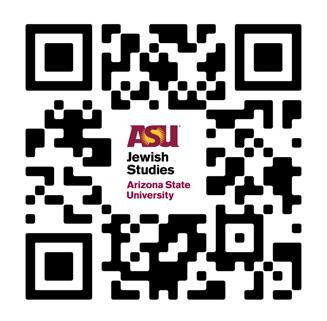
Chelsea Haines
The University of California, Irvine hosted the “Migration, Race, and Jewish Art of the Americas” workshop and conference on March 6–7, 2025. This event drew international attention and gathered leading scholars, artists, and curators to explore how Jewish visual culture intersects with race, migration and identity across the Americas.
Spanning centuries and regions, the two-day program featured bold new research on Jewish cultural production and its shifting meanings in relation to migration and racial politics. Of special note was the artist Olivia Guterson’s reflections on her own practice, which bridges her Jewish and African American heritage. Literary scholar Sarah Casteel’s (Carleton University) closed of the conference with an exploration of how Jewish artists navigated and represented geographies before and during the Holocaust.

The event was co-convened by Chelsea Haines (Arizona State University) and Abigail Lapin-Dardashti (University of California, Irvine) and will lead to a forthcoming special issue of Latin American Jewish Studies, which they are guest-editing.
In recognition of the publication of this special issue of Latin American Jewish Studies, ASU will host a day-long event in March 2026 that will present research-in-progress on artistic and literary responses to Jewish migration to and within the Americas. The workshop aims to advance scholarship on how Jewish artists and writers articulated migration, religion, race, and their positionality in their work. It will feature a public keynote lecture by New York-based artist Yevgeniy Fiks, who has created his own concept of Yiddish as a “cosmic” language that is capable of connecting heaven and earth, Jewish and global culture, everyday life and fantastic utopia.
Madelaine Adelman
I was an unseasoned faculty member in the (then) School of Justice Studies, when Professor Samuelson joined the (then) Department of History at ASU in 1999. Since that time, I have regularly turned to Hava as a mentor. Hava has helped me to navigate the intricacies of scholarly life. Anyone who has met her knows that she talks “dugri,” refreshingly offering her insights in a frank way that eliminates time-consuming or opaque euphemisms.
Hava became the director of Jewish Studies in 2008, and established the Center for Jewish Studies shortly thereafter, providing an intellectual home for students, faculty, and community members. She tenaciously generated resources for the Center which she reinvested into faculty-led seminars, community learning programs, and support for student travel and research. I am grateful that Hava helped to underwrite the cost for ten ASU students to participate in a study abroad program this summer, which I co-led in Berlin and Amsterdam. The program, “Never Forget: Exploring Holocaust Memories and Memorials,” was developed by my colleague Chris Holman. This trip was the first time may of the students traveled abroad and for some it was their first time studying Jewish culture and history.
Somehow, along the way, despite ever-increasing administrative demands on Hava, including faculty recruitment and retention along with donor cultivation and stewardship, she produced award-winning scholarship. Her scholarship is often collaborative and always contributes new ways to approach various fields of inquiry, including religion and the environment, transhumanism, Judaism and science, Jewish feminism and Jewish philosophy. Hava’s intellectual generosity is found as well in her multi-year service as Editor-in-Chief of 21 volumes that constitute the Library of Contemporary Jewish Philosophers, and her founding in 2009 of the international Judaism, Science & Medicine Group, which she continues to convene annually.
It is impossible to briefly recount the impact that Hava has had on me and others in the ASU community and beyond. Hava’s innovation and determination has positioned Jewish Studies as an interdisciplinary space to grow professionally and communally. Her resulting institutional legacy will shape Jewish Studies for generations to come.
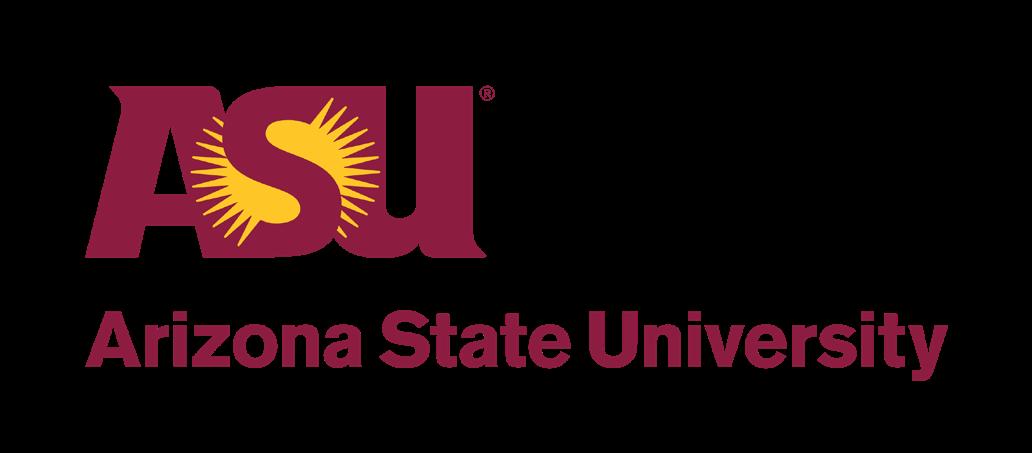
PO Box 874302
Tempe, AZ 85287-4302
Please help ensure we can continue to offer high-quality Jewish Studies programs to our students and the community by supporting ASU Friends of Jewish Studies. Thank you in advance for your support!
You can make a secure donation online at: jewishstudies.asu.edu/donate
If you prefer to send a check, it should be made payable to: “ASU Foundation”. Please write “Friends of Jewish Studies” in the memo field.
Please mail checks to: Brittany Martin, ASU
The College of Liberal Arts and Sciences PO Box 872401
Tempe, AZ 85287-2401
